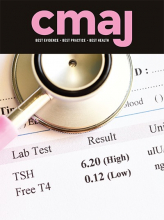In their commentary in CMAJ, Bielawska and Dubé1 criticize our recent guideline on colorectal cancer screening published in BMJ.2 They reason that because screening is effective in reducing the incidence and mortality of colorectal cancer, screening programs need to be implemented, and all individuals in the target group (defined by age) should participate. For patients who are reluctant to participate, Bielawska and Dubé suggest that providers use risk calculators and decision aids to improve uptake of screening.1
We believe that people are entitled to know the answer to the following questions to make a decision about screening:
What is my risk of the disease and what is my risk of dying from it?
How much do I reduce my risk if I participate in screening?
What are the harms and burdens of screening participation?
One of the reasons our guideline has different recommendations from others is that no previous guideline has explicitly answered these questions by presenting the absolute risk of colorectal cancer and the absolute benefits of screening to reduce that risk, weighed against the burdens and harms.
Bielawska and Dubé are concerned that encouraging informed decision-making by providing individuals with the best possible answers for the 3 questions above would be dangerous, because people may decide that their disease risk or the effect of screening is too small to get screened. We are puzzled by their parental approach.
Bielawska and Dubé are particularly concerned about minority populations and health inequity. We agree with the concern, but we worry about the proposed solution, which is not to inform people, but to persuade them to undergo screening. One cannot assume that equal and high participation across different population groups leads to decreases in health disparity and patient gain. This is because there is no linear relation between screening participation and effectiveness of a screening program, and because screening efficacy in minority communities is more uncertain as they were underrepresented in screening trials.3
Withholding information necessary for people to make informed decisions does not improve public trust or population health. Risk calculators and decision aids are designed to provide easy-to-understand data answering the 3 questions mentioned earlier and thereby enable people to make personal decisions. Some will conclude they want to participate, and some will not. Our task as guideline makers — according to globally accepted standards for trust-worthiness — is to make sure they have that choice by being transparent about how we reached our recommendations and by facilitating informed choices.4 Bielawska and Dubé’s task as screening providers is to ensure access to high-quality screening services for those who want it.
Footnotes
Competing interests: None declared.











